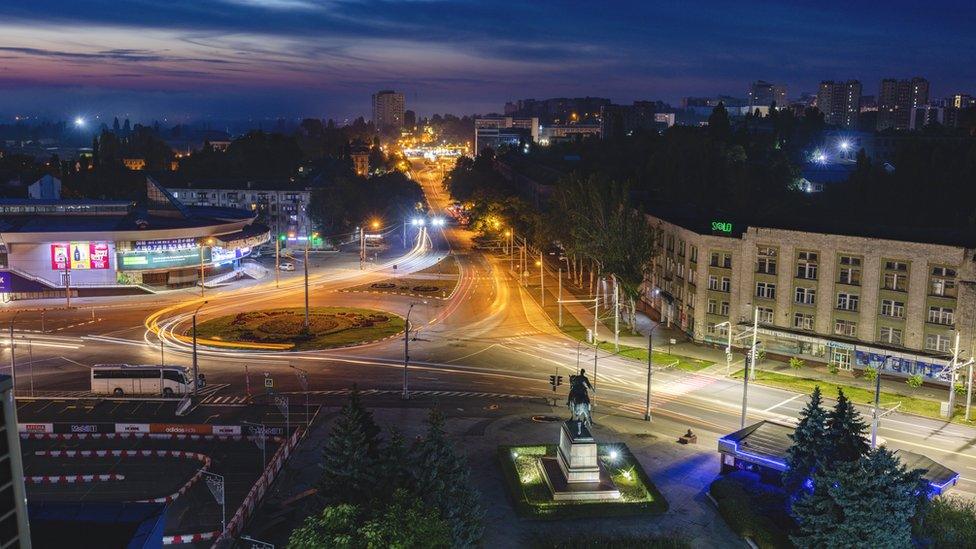Moldova profile - Timeline
- Published

Moldova's capital, Chisinau, at dusk
A chronology of key events:
14-15th Centuries - Principality of Moldova stretches roughly between Carpathian mountains and Dniester river.
16th - early 19th Century - Moldovan territory disputed by several powers with the Ottoman Empire and Russia as the main rivals. Numerous wars.
1812 - Treaty of Bucharest grants Russia control of eastern Moldova or Bessarabia, the area between the River Prut and the west bank of the Dniester. The Ottoman Empire gains control of western Moldova.
1878 - Ottomans recognise independence of Romanian state including western Moldova.
1918 - Following the Bolshevik revolution in Russia, Bessarabia declares independence. Its parliament calls for union with Romania.
1920 - Treaty of Paris recognises union of Bessarabia with Romania. The Bolsheviks do not.
1924 - Moldovan Autonomous Soviet Socialist Republic established east of the Dniester river within Ukraine.
Soviet years
1940 - The Soviet Union annexes Bessarabia and combines it with most of the Moldovan Autonomous Soviet Socialist Republic to form the Moldavian Soviet Socialist Republic.
1941-1945 - Romania re-establishes control after its ally Nazi Germany invades the Soviet Union until the end of World War Two, when the Soviet Union regains control.
Late 1980s - Resurgence of Moldovan nationalism in the wake of the Gorbachev reforms in the Soviet Union.
1990 - Moldova declares sovereignty. The Trans-Dniester region declares independence, which the Moldovan government refuses to recognise.
Independence
1991 - Moldova declares independence. It joins the Commonwealth of Independent States, the successor to the Soviet Union.
An upsurge in fighting in the Trans-Dniester region leads to a state of emergency being re-imposed. Hundreds die in the fighting. Russian peacekeepers are deployed after a ceasefire agreement.
1996 - Petru Lucinschi elected president.
1997 - Negotiations resumed with Trans-Dniester. Agreement is signed granting further autonomy and calling for more talks.
1998 - Elections see communists emerging as biggest party, but a centrist, reform-minded coalition forms the government.
2001 February - Elections see the communists under Vladimir Voronin win just over 50% of the vote.
2002 January - Announcement of plans to make Russian an official language and compulsory in schools sparks months of mass protests which end only when the scheme is shelved.
Russia row
2002 December - OSCE extends deadline for withdrawal of Russian weapons from Trans-Dniester until end of 2003. The deadline is later extended into 2004. Russia says its troops will stay until a settlement is reached.
2003 November - President Voronin pulls out of signing Russian-proposed deal on Trans-Dniester settlement following protests by nationalists who say it gives too much influence to Russia.
2004 July - Dispute over closures of Moldovan-language schools in Trans-Dniester using Latin rather than Cyrillic script. Moldova imposes economic sanctions on region and pulls out of talks on its status.
2006 January - Russian gas giant Gazprom cuts off supplies when Moldova refuses to pay twice the previous price. A temporary compromise is reached as talks continue.
2006 March - Trans-Dniester leadership reacts angrily to new regulations requiring goods entering Ukraine from Dniester to have Moldovan customs stamp. Moldova says the rules, backed by the EU, US and OSCE, aim to stop smuggling.
Moldova protests against a Russian decision to temporarily suspend imports of Moldovan wine on health grounds, saying the move is politically motivated.
2006 September - Trans-Dniester referendum overwhelmingly backs independence from Moldova and a plan eventually to become part of Russia.
2008 April - President Vladimir Voronin and Dniester leader Igor Smirnov meet for the first time in seven years; agree on the need to restart peace talks which broke down in 2001.
2009 July - New parliamentary polls. Communists lose their majority.
EU association agreement
2009 September - Four pro-western parties form coalition government. Liberal Democratic Party leader Vlad Filat becomes prime minister.
2011 December - Anti-corruption campaigner Yevgeny Shevchuk defeats pro-Russian candidates in Trans-Dniester's presidential election. Pledges to establish "friendly relations" with Moldova while continuing to press for the independence of the separatist region.
2012 March - Nicolae Timofti elected president, ending years of failure to agree.
2013 May - Iurie Leanca takes over as prime minister of pro-western government.
2014 June - Moldova signs association agreement with the European Union, prompting Russia to impose import restrictions on the country's agricultural produce.
Banking scandal
2014 November - National Bank uncovers official inaction over embezzlement of $1bn - about 12.5% of annual GDP - from the banking system, prompting a major political crisis and credit crunch.
2016 January - Pavel Filip of the pro-EU Democratic Party forms a new coalition.
2016 November - Pro-Russian candidate Igor Dodon beats pro-European candidate Maia Sandu to win the first direct presidential election in 16 years.
2019 June - Maia Sandu forms a coalition with the pro-Russian Socialist Party, but her government falls in November after failing to agree on how to appoint a prosecutor into the banking scandal.
2019 November - Former finance minister Ion Chicu forms a non-party government largely staffed by ex-aides of President Dodon.
2020 March - Temporary state of emergency declared due to outbreak of Covid-19.
2020 November - Pro-European opposition candidate Maia Sandu is elected Moldova's first women president, defeating the incumbent pro-Russian president Igor Dodon.